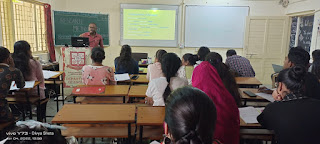Hello Friend
On 3rd January we attended a workshop on Translation Studies by Vishal Bhadani sir at the Department of English,MKBU.This blog is assigned by Prof.Dilip Barad sir as a part of a thinking activity about the learning outcome of this workshop.The session was in two parts.In the 1st session he began with the very interesting metaphors and how can we connect it to the translation.And then he started his love story with the lady called #translation in a very interesting way.Translation is like interesting metaphors.There is a music notion inside.In his talk he also referred to Gayatri Chakravarthy Spivak she said that
"Translation is the closest reading of the text."
Vishal Bhadani
👉Worked as a faculty in English with the premier institutes and universities of the state such as The MSU, SPU, IITE, and Marwadi University.
👉Wrote and translated textbooks for Cambridge University Press, Gujarat State School Textbook Board, National Institute of Open Schooling, etc.
👉Prepared training Manuals for the Finishing School Programme, Govt. of Gujarat, and Learning Materials for BAOU, Ahmedabad.
👉Designed world’s first online course on Gandhiji with the title “ Gandhian Methods to Sustainable Living and Happiness” on Udemy Platform. At present, 750 students from 82 countries are studying the course.
👉Trained thousands of teachers and professors across the state on Science of Learning and delivered a series of lectures for parents.
👉Translated novels of Dhruv Bhatt such as “Timirpanthi’ and ‘Akoopar' In English. The Sociology Textbook of 11th Standard for the National Institute of Open Schooling into Gujarati. Working as a Textbook Board.
👉Delivered experts talks at several platforms such as Symbiosis UniversityPune, Grand Education Fair, Ahmedabad, HRDC- Gujarat University, Children UNiversity-Gandhinagar, Baba Saheb Ambedkar Open University, Ahmedabad ,IITE, Gandhinagar, Vanita Vishram Women’s College-Surat, English Department, SPU and Bhavnagar University, Sahitya Academy Gandhinagar, IIT Rajkot,KCG Ahmedabad, Sarvajanik Education Education Society, Surat, Gandhinagar Institute of Technology, to name a few.
👉Passionate for the neurological basis of learning and designing learning ecosystems.
👉Publications:
👉Youtube: Science of Learning
Why Is Translation Important ?
In this constantly changing world, it has become important to keep up with the latest trend and that’s why translation is important in the media to formulate effective strategies. Multilingualism is something that should be seriously considered these days in business because it paves the accurate direction to companies in foreign economy. Besides, it ensures that you are passing on accurate messages from one end to another.
1) Has your understanding of translation improved?
Yes,My understanding of translation has improved.Because I haven’t attended any workshop before this and I wasn't aware about the translation studies.It is necessary to know the etymology of any word to connect it with the particular concept.How to translate with particular words.These all things we learnt so far.
2)Translation in terms of metaphors?
We can say that translation is like an interesting metaphors.Bhadani sir gave 7 metaphors to explain how translation Studies is connected with each other.We have to find the word from the given context.It is like a music notions.And it is the closest reading of the text.We can follow playfulness in it.We have to move commuting across linguistic zones.
3) What according to you is the most difficult aspect of practical translation?
The most difficult aspect of practical translation is machine translation.Google translate can not help us at all.The other difficult part is to find appropriate words to replace.Dictionary is a very important tool in translation studies.Sometimes it happens that we can not find the exact meaning of the word in another language.Practical translation is very difficult at the beginning level.
4) Learning outcome from the workshop.
Walter_Benjamin rightly said that
“It is the task of the translator to release in his own language that pure language that is under the spell of another, to liberate the language imprisoned in a work in his re-creation of that work.”
Commuting across the logistics zones is very important while doing translation.He also talk about how intertextuality is used many authors in their work.The another benefit of this work is financial freedom.Translation is an epistemological exercise.To become translator we have to become passionate, explorer to the work.At the end of the session students from sem 2 and sem 4 gave their feedback and Vote of thanks.The session was conclude by Vaidehi Hariyani ma'am.The session was followed by the students-teacher interaction.We did many exercises given by sir. It was quite a good experience for all of us.I would like to thank Dilip Barad sir for organising the session.
Thank You.



















